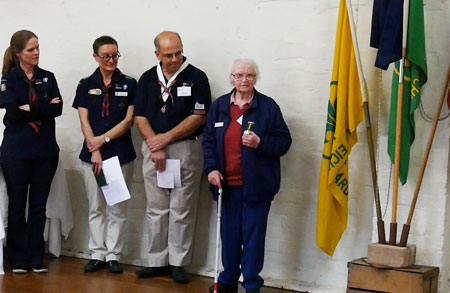Farewell, sir!
Noel you have shown such a dependable, supportive, encouraging, and honest attitude during your time at Latitude and the Point of Center and Goodwill...

Goodbye, kind mate!
We’ve started taking bets that after one week home, you’re going to be begging to come back to us 😊…at least, that’s what we all secretly hope. The office sure is going to be incomplete without you.
One of Sydney Night Patrols longest serving volunteers, Noel Davar,
has worked with the team for over 30 years.Throughout his time
volunteering, Noel has seen the scope of the Patrol evolve, but affirms
that social connection has always been one of its greatest impacts.
Chefs, Calcutta spice collectors and seed breeders collaborate to create flavorful new foods The Splendid Table: “The unfortunate reality about seeds is that most are not bred and selected for flavor. Rather, they are chosen specifically for the yield, uniformity and shelf stability of their fruit or vegetable. Chef Dan Barber wants to change that. The chef-owner of Blue Hill and Blue Hill at Stone Barns wants to help create seeds that bring forth new foods with unexpected and unique flavors. Which is why he – along with seedsman Matthew Goldfarb and seed breeder Michael Mazourek – cofounded of a new seed company called Row 7. They work directly with professional chefs, who give guidance on what flavors to breed for in their vegetables. Barber explained to Francis Lam that this type of partnership could change how and what we all eat. See the Cook + Grow section of Row 7’s website for more information on growing and cooking with their unique produce…”
Gizmodo – “…RSS is a family of technologies that give you a simple feed from a spot on the web—a news site, a podcast, a blog—into your RSS reader. It’s a timeline of sorts, yes, but it runs at a sane speed, and it stays in your control, unlike Facebook or Twitter’s unknowable whims, and it excludes the vast majority of toxic noise that characterizes so much of social media. Folks, RSS is still good. More than just good, RSS is better in many ways than Twitter…”
See also via LLRX – this related article by Pete Weiss – A guide to RSS feeds using beSpacific research updates

'You will not have a son!' Murdoch family feud exposed in blockbuster ...
The Sydney Morning Herald
New York: Lachlan Murdoch was so angry at his father Rupert for planning to sell off a chunk of the family business empire that he threatened ...
9 Juicy Details From the Times' Deep Dive Into the Murdoch Family ...
International-New York Magazine
International-New York Magazine
Can tech companies help fight U.S. Census misinformation?
The
U.S. election isn’t the only 2020 event threatened to be disrupted by
misinformation.
Reuters reported Wednesday that the U.S. Census Bureau has asked Google, Facebook and Twitter to “help it fend off fake news campaigns it fears could disrupt the upcoming 2020 count,” citing Census officials and others briefed on the plans.
The decennial census, the constitutionally mandated count of every resident in the United States, is used for political and economic purposes. It not only determines the number of House of Representatives seats each state gets, but is used to calculate how billions of dollars in federal money are distributed among the states. Any disruption of the count could have a big impact on the lives of Americans.
There is already some angst surrounding the 2020 Census because it’s the first one to be conducted largely online (will the systems be ready?) and because of the ongoing legal dispute over whether people can be asked whether they are citizens, as the Trump administration wants. The Supreme Court is expected to hear arguments on the question next month.
Add to that the potential for misinformation spread on social media, and the possibility of trouble grows.
Dipayan Ghosh, director of the Platform Accountability Project at the Harvard Kennedy School, contacted via email, said nefarious disinformation operators are likely to attempt to infiltrate American information and media networks in the coming months with misleading content that suggests citizens should not or cannot participate — precisely because doing so can hinder the full functioning of our national democratic process.
Which brings us to the companies that run those platforms: Could they help? Ghosh thinks they can.
“Companies can build artificial intelligence systems to counteract this kind of negative behavior by inferring signals that can suggest who the disinformation operators are and where the misleading content is, and proactively take that sort of content down,” he said.
He noted that the companies have already done this kind of work in the case of Russian and other foreign disinformation operations pertaining to our national elections. They’ve also removed domestic disinformation operators and white supremacists from their platforms.
“They can do the exact same thing in regard to disinformation pertaining to the census,” he said. ”The question will be whether and how they can be fully incentivized to take this problem seriously enough.”
Reuters reported Wednesday that the U.S. Census Bureau has asked Google, Facebook and Twitter to “help it fend off fake news campaigns it fears could disrupt the upcoming 2020 count,” citing Census officials and others briefed on the plans.
The decennial census, the constitutionally mandated count of every resident in the United States, is used for political and economic purposes. It not only determines the number of House of Representatives seats each state gets, but is used to calculate how billions of dollars in federal money are distributed among the states. Any disruption of the count could have a big impact on the lives of Americans.
There is already some angst surrounding the 2020 Census because it’s the first one to be conducted largely online (will the systems be ready?) and because of the ongoing legal dispute over whether people can be asked whether they are citizens, as the Trump administration wants. The Supreme Court is expected to hear arguments on the question next month.
Add to that the potential for misinformation spread on social media, and the possibility of trouble grows.
Dipayan Ghosh, director of the Platform Accountability Project at the Harvard Kennedy School, contacted via email, said nefarious disinformation operators are likely to attempt to infiltrate American information and media networks in the coming months with misleading content that suggests citizens should not or cannot participate — precisely because doing so can hinder the full functioning of our national democratic process.
Which brings us to the companies that run those platforms: Could they help? Ghosh thinks they can.
“Companies can build artificial intelligence systems to counteract this kind of negative behavior by inferring signals that can suggest who the disinformation operators are and where the misleading content is, and proactively take that sort of content down,” he said.
He noted that the companies have already done this kind of work in the case of Russian and other foreign disinformation operations pertaining to our national elections. They’ve also removed domestic disinformation operators and white supremacists from their platforms.
“They can do the exact same thing in regard to disinformation pertaining to the census,” he said. ”The question will be whether and how they can be fully incentivized to take this problem seriously enough.”

...technology
- Instagram (yes, Instagram) is “teeming with conspiracy theories, viral misinformation, and extremist memes,” Taylor Lorenz wrote in The Atlantic — and it’s largely escaped the kind of scrutiny that reporters have paid to Facebook and Google. Craig Silverman of BuzzFeed News also found conspiracy accounts getting massive engagement, and, in 2017, Jonathan Albright of the Tow Center wrote about how Instagram had become a major source of political propaganda. Meanwhile, Bellingcat has a new story about how it located The Netherlands’ most-wanted criminal using Instagram.
- GoFundMe banned users who raised money to spread anti-vaccine conspiracy theories, The Daily Beast reported. The move made GoFundMe the latest internet platform to take an aggressive stance on anti-vaxxer misinformation, following Pinterest, Facebook and YouTube, which faced pressure from American lawmakers to do so.
- You’ve probably heard by now that Facebook this week purged accounts linked to Iran, Russia, Macedonia and Kosovo, citing “coordinated inauthentic behavior.” The company provides examples on its blog.
...politics
- Every candidate running for president in the United States is getting an unclassified report on the major national security challenges facing the country. The report, wrote The Washington Post’s Shane Harris, has the feel of an “urgent primer” and comes in response to “the recent rise and abundance of fake news and foreign election interference.”
- CNN’s Oliver Darcy writes that Twitter’s algorithm is amplifying extreme rhetoric, often posted by ”media or internet personalities who hold fringe views.”
- We've written plenty about efforts in India to combat misinformation in advance of national elections this month and next. India's citizens are concerned, too. Pew Research Center this week has published a survey about how the Indians get their information and how they view misinformation. It found that 77% say they are very or somewhat concerned about people being exposed to false or incorrect information when they use their mobile phones.
...the future of news
- Reuters is training its journalists how to spot deepfake videos online, Digiday reported. It even created its own deepfake to emphasize the point. FWIW: the IFCN did this over the summer and it was really hard.
- Google is assembling a team of philosophers, engineers, and policy experts to "help it navigate the moral hazards presented by artificial intelligence without press scandals, employee protests, or legal trouble," MIT's Technology Review reported.
- Would requiring tech platforms to put all of their ads in a publicly searchable archive cut down on political misinformation? Writing for The New York Times, Philip N. Howard said the idea would “create a record of all such misinformation campaigns that could be used to prevent them in the future.”

Fact
vs. Fake is taking a break this week in preparation for International
Fact-Checking Day on Tuesday, April 2! Launched by the IFCN in 2016, the
day aims to raise awareness of the importance of fact-checking in the modern
era of misinformation.
Here
are some ways to get involved on International Fact-Checking Day. Learn more in
Poynter’s
Fact-Checking Day guide and at Factcheckingday.com.
1.
Download
our
gamified lesson plan in four languages and discover 200
ways to teach about fact-checking.
2.
Take
our quiz to test your knowledge of misinformation.
3.
Polish
your digital verification skills through our Hands-On
Fact-Checking Short Course.
4.
Visit
the YouTube
Learning channel’s guest picks playlist celebrating fact-checking and
digital literacy.
5.
Read
our tip sheets and learn how to do everything from verifying social media
videos to geolocating images.
6.
Connect
with fact-checkers through the new,
interactive EduCheckMap.
7.
Participate
in a
Reddit AMA with PolitiFact at noon EST on April 2.
8.
Go
behind the scenes with Poynter’s fact-checkers on
Facebook Live at 2 p.m. EST on April 2. Ask us your questions here.
9.
Watch
NBC’s “Stay Tuned” daily news show on Snapchat as it features a special guest,
“NBC Nightly News” anchor Lester Holt – the
first MediaWise Ambassador – sharing MediaWise fact-checking tips with host
Savannah Sellers.
10. Join the conversation by using #factcheckingday.

Amid
all the fact-sorting involving the report of Special Counsel Robert Mueller
this week, it was particularly important to parse the collusion/obstruction
equation. PolitiFact did
just that.
According
to the letter to Congress from Attorney General William Barr, the special
counsel did not establish that President Trump or his aides colluded with
Russia to win the 2016 election, and he did not draw a conclusion as to whether
the president obstructed justice. He left that to Barr, who declined to.
The
attorney general noted that the lack of an underlying crime meant there was nothing
to obstruct, though he acknowledged that wasn’t the sole determinant. The
conclusion set off a whole debate about whether an underlying crime is needed
to prove obstruction.
PolitiFact
checked with 11 experts on the question, who generally agreed that obstruction
of a non-crime is possible. They cited high-profile cases -- those of former
Dick Cheney aide Scooter Libby and TV personality Martha Stewart. But they said
the precedents there included some nuances, which the fact-checker laid out.
What we liked: This was a good explainer of a
complicated topic and, as such, did not include one of PolitiFact’s signature
Truth-o-Meter ratings. It also included historical context, drawing parallels
to Watergate, while also pointing out differences.
The
fact-checker, Louis Jacobson, noted in the piece that Trump ended up pardoning
Libby. One fun fact that he might have included: Trump thought Stewart also got
a raw deal, and considered
pardoning her, too.

1.
The
Associated Press wrote
about how Facebook is leveraging its fact-checking partners to cut down on
misinformation about the Indian election.
2.
The
reappearance of a longstanding online hoax warning of attempted kidnappings of
young women or children has sparked a series of vigilante attacks on Roma
living in France, the
Guardian reported. The report said some 50 people armed with sticks and
knives attacked Roma people and set fire to their parked vans.
3.
Google
is
releasing the beta version of its fact-checking search engine early next
week.
4.
A
“Fox & Friends” reporter cited a tweet from user called QAnon76 praising an
executive order from President Trump on campus free speech, the Daily
Beast reported, noting the user’s 160,000 followers.
5.
This
may be a first. The Washington National Cathedral fact-checked
the president on funeral costs for the late Sen. John McCain (R-Ariz.).
6.
Florida
State University next week will host an event
on truth and misinformation.
7.
From
AFP: No,
this is not a video of the man accused of killing 50 people in New Zealand
mosques being beaten in prison.
8.
The
IFCN’s new associate director, Cristina Tardáguila of Agência Lupa, spoke
to CheckNews about how it tripled its fact-checking audience.
9.
PolitiFact
has
partnered with Telemundo to bring fact checks to millions of
Spanish-speaking Americans ahead of the 2020 presidential election.
10. Metafact, the new crowdsourced health
fact-checking site we
wrote about two weeks ago, has
received full funding on Kickstarter.
